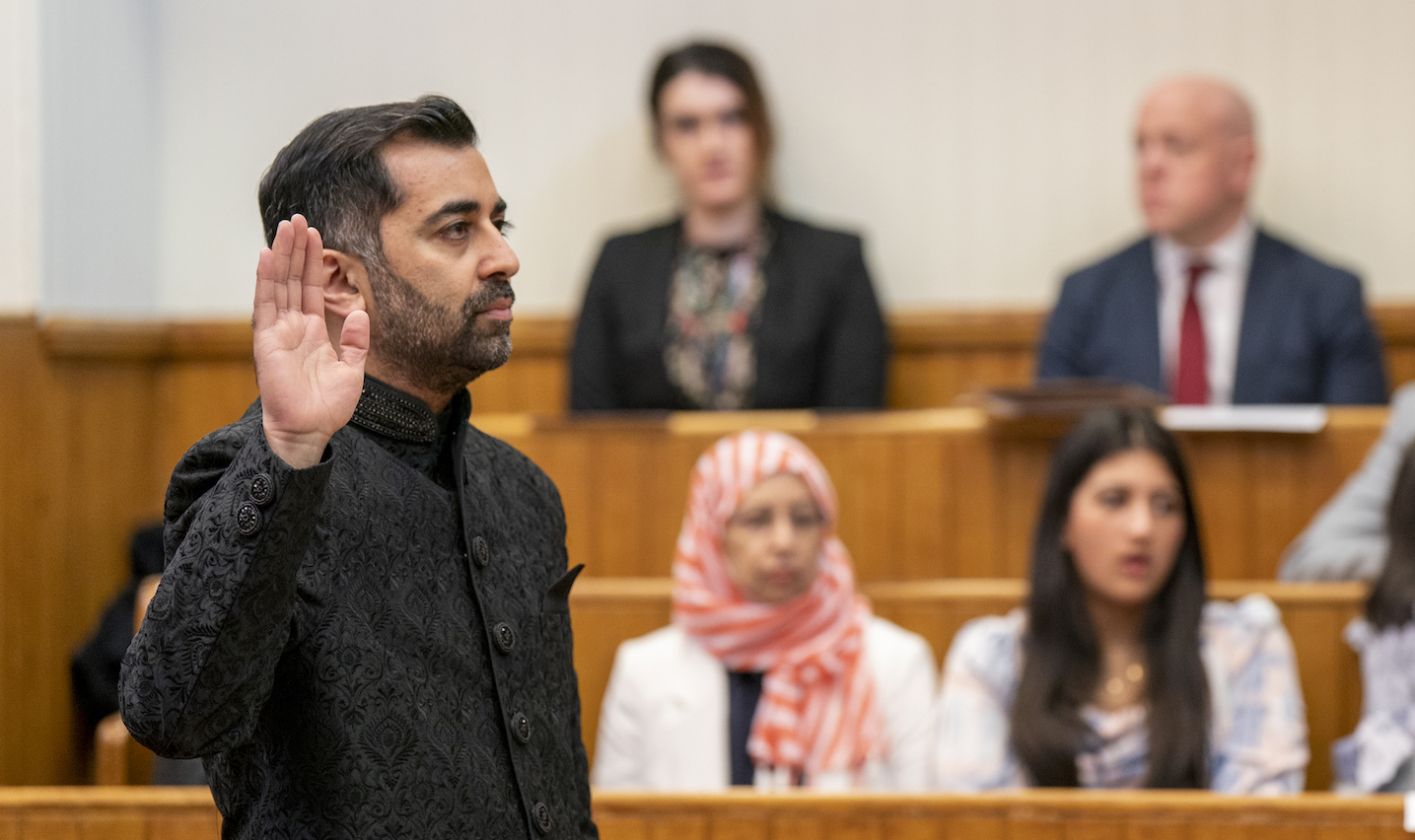Westminster is not plotting to steal powers from Holyrood or roll back devolution, contrary to the campfire stories the Scottish establishment likes to scare itself with. In reality, neither Labour nor the Tories are interested in considering what impact Holyrood has had on the Union.
It’s peculiar, given both parties have self-interested reasons for rethinking the arrangements of devolution. Less than a decade into the experiment, the SNP had seized control of Holyrood and unilaterally renamed the Scottish executive ‘the Scottish government’. The party has used the Scottish government, and the UK civil servants who staff it, to plot both independence and a separate Scottish foreign policy, despite both matters being reserved to Westminster.
The SNP and its leader are politically vulnerable. There has never been a better time for the UK government to make a move
Westminster has responded with weakness, complacency and neglect, subsequently acquiescing to the renaming of the Scottish executive, giving the nationalists a referendum on independence, and not one but two tranches of extra powers. Each concession only emboldened the separatists, but this has not shaken the hyper-devolutionists’ faith that just one more sop will secure the Union. Devolution is a bit like communism that way: no matter what happens, it can never fail. The argument is either that there has not been enough devolution or that real devolution has never been tried.
There is an opportunity to rebalance this settlement with Humza Yousaf. The new SNP leader was elected on the narrowest of margins – 52 to 48 per cent – and takes over a party that is divided on independence strategy. Yousaf’s rival in the leadership contest, Kate Forbes, quit the Scottish cabinet after he tried to demote her on his first day as leader. The party lost almost a third of its members last year and is still under police investigation over the spending of £667,000 in members’ donations.
The SNP and the Scottish government have never been more distracted: the NHS is currently recording its worst-ever performance; the Covid recovery plan is failing; state-owned ferry contracts have trebled in cost and remain undelivered; the educational attainment gap is growing; a manifesto pledge to upgrade Scotland’s deadliest road remains undelivered; the Gender Recognition Reform (GRR) Bill was opposed by two-thirds of Scots; and there are internal tensions over the SNP-Green coalition. Even inside the SNP, Yousaf is considered all patter and no ability, best known for a slew of policy failures and personal gaffes across ten years in government. He is also snide, arrogant, and patronising.
The SNP and its leader are therefore politically vulnerable. There has never been a better time for the UK government to make a move. I have written extensively about the various ways in which devolution could be reformed to strengthen the Union and reassert Westminster’s primacy. But comprehensive reform would require national self-belief and a bit of gumption, neither evident on either the Treasury or the opposition benches.
Still, there are some minor tweaks that, while reining in the worst excesses of the SNP, wouldn’t require any great courage from ministers. First, they could bring to an end the Scottish administration’s use of the UK civil service to advance the break-up of the UK. That it has been allowed to do so unimpeded speaks to both Westminster’s neglect and Westminster’s masochism. Robert Frost once said a liberal was ‘a man too broadminded to take his own side in a quarrel’. There must be an awful lot of liberals in Downing Street.
It should be entirely uncontroversial for Whitehall to forbid UK civil servants from undertaking duties related to independence. If the UK parliament was ever soft-headed enough to grant another referendum, this rule could be suspended, but permitting one arm of the British state to work towards the dismantling of that state is decadent and self-debasing.
Another way in which the SNP oversteps the boundaries of the devolution settlement is by pursuing a separate Scottish foreign policy. I have written about this, and its potential to undermine the UK globally, before. The Scottish government is only going to step up its diplomatic campaign. Glasgow University law professor and former Tory MSP Adam Tomkins recently warned that the next salvo will be joining efforts to boycott Israel.
The Foreign Secretary’s word, and that of the Prime Minister, could become worthless in foreign capitals, with their opposite numbers recognising that they don’t call the shots on UK foreign policy. Foreign governments, concerned with advancing and protecting their own interests, would naturally begin engaging directly with the Scottish government. At that point, in the eyes of the international community at least, the UK would be finished as a sovereign state.
The same remedy against the misuse of the civil service could be applied here, but SNP ministers could still do real damage without them. The UK government should consider an amendment to the Scotland Act: ‘Scottish ministers must refrain from any actions which could have an effect on the foreign policies, international relations, treaties, agreements or memberships of the UK government.’
Naturally, the hyper-devolutionists would have a fit over even these modest tweaks. They would warn UK ministers that such actions would unite the SNP and the Scottish people against a Westminster power grab. These people said the same about blocking the Gender Recognition (Reform) Bill, about legal challenges to bills incorporating international conventions into Scots law, and about refusing to grant the SNP another referendum. In each case, the UK government acted and emerged either stronger or no weaker.
Warning ministers to avoid a fight is pointless because Humza Yousaf is determined to have one. He has already demanded another referendum. He has appointed a minister for independence to his new government. He intends to take ministers to court to overturn their block on the Gender Recognition (Reform) Bill. Yousaf has even less regard for the UK than Sturgeon. After a mob in Glasgow prevented the UK Border Police from removing two asylum seekers in 2021, Yousaf, who was Scottish justice secretary at the time, was asked if it was his place to ‘delegitimise’ the UK rule of law. He replied: ‘Yes, actually. I think people look to me for ensuring that I, and the Scottish government, are the voices of justice.’
Humza Yousaf will have his fight. His political survival depends upon it. The UK government will have to decide whether to fight back or debase itself once again.








Comments